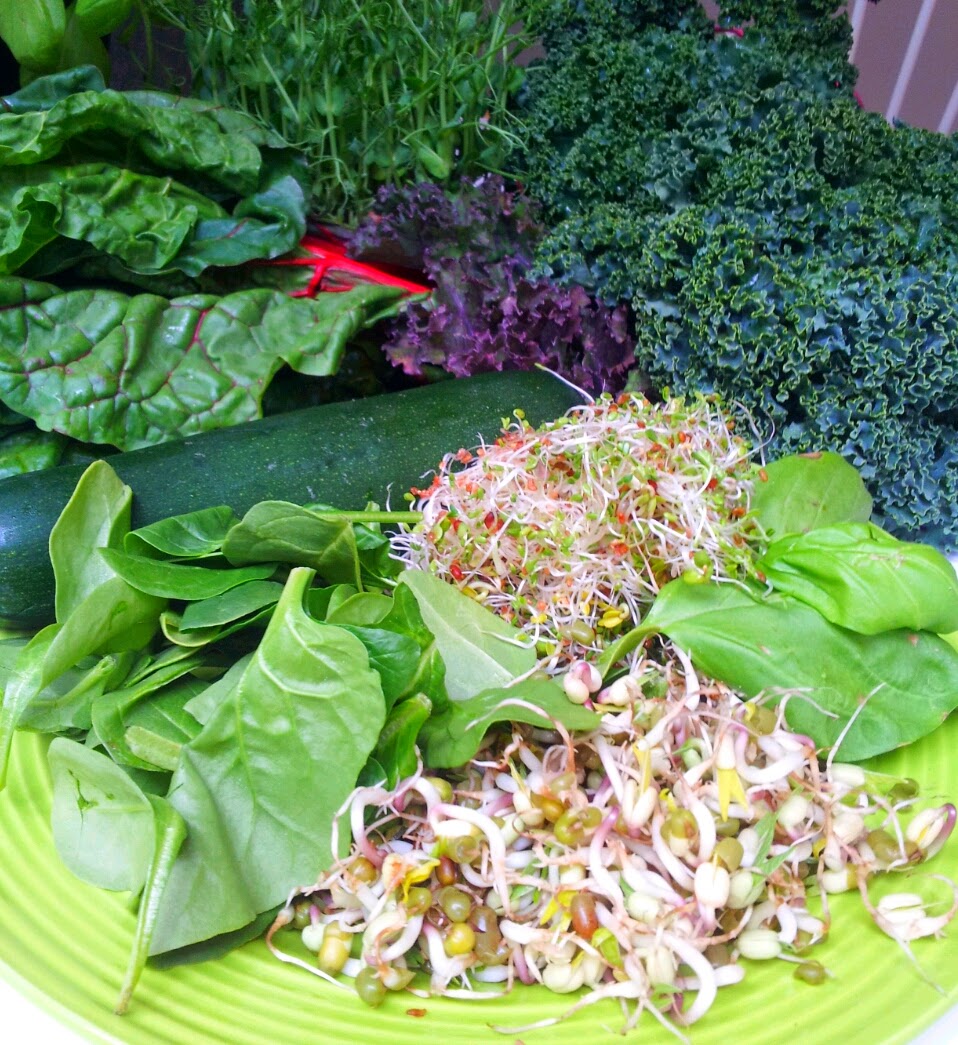 |
| Alfalfa, Mung Bean, Chickpea Sprouts |
Sprouts are naturally good for you and delicious! Growing your own sprouts at home will help you save money and will provide you with the freshest, cleanest, and most nutrient dense sprouts on the planet! Sprouting can increase the vitamin content of some seeds by up to 20 X's their original value within a few days of sprouting! They really are little phytonutrient miracles!
Once you give it a try, you'll discover that incorporating fresh sprouts into your diet is a simple process that will begin to flow naturally into a daily or weekly habit. The key to growing top notch sprouts is to rinse and drain the sprouts extremely well. I suggest the jar method as the easiest and least expensive method. Being budget and eco-friendly, save a large glass jar such a spaghetti sauce, pickle, or large jelly jar and use it for growing sprouts. Clean the jar and remove the label by boiling water in a large pot and submerging the jar in it. The only thing you will need to purchase are the sprouting lids which will run you about $2-$5. A good rule of thumb for measuring out sprouts is a 1:3 ratio. 1 cup sprouts to 3 cups water, adjust the ratio to fit your jar size. Below is a more specific chart for sprouting times and measurements.
The method: Into a clean, dry mason jar add your seeds, nuts, or beans. Add enough water to cover and use the chart below to determine soaking time. After your soaking time is complete, place a sprouting lid onto the jar and drain all water from the jar. Fill again and rinse. If you have a standing dish rack, place your jars on the rack, upside down to make sure all the water drains out. If you don't have a rack, take a bowl and place your jar upside down in the bowl at an angle to allow all the water to drain out. Good drainage is the most important part. Any leftover water at the bottom of the jar can cause the sprouts to go bad inviting bacteria and mold. Place your sprouts in a dark, dry place like a cupboard or keep on the counter top and cover with a towel. Keep your sprouts in the dark during the sprouting process. When the sprouts are ready (you can determine readiness based on tail size) then place your sprouts in the light for a few hours to green up.
SEED/NUT/BEAN
|
AMOUNT
|
SOAK TIME
|
SPROUT TIME
|
Adzuki
|
1 ½ cups
|
8 hours
|
3 days
|
Alfalfa
|
3 Tbsp.
|
6 hours
|
3 days
|
Almond
|
3 cups
|
8 hours
|
1-2 days
|
Barley
|
2 ½ cups
|
7 hours
|
2-3 days
|
Buckwheat
|
2 cups
|
6 hours
|
2 days
|
Buckwheat (hulled)
|
2 cups
|
10 hours
|
1 day
|
Cashew
|
3 cups
|
5 hours
|
1 day
|
Chia
|
3 Tbsp.
|
5 hours
|
2-3 days
|
Corn
|
2 cups
|
8-10 hours
|
3 days
|
Flax
|
3 cups
|
6 hours
|
2-3 days
|
Chickpea
|
1 ½
|
8 hours
|
2-3 days
|
Hazelnut
|
2 cups
|
8 hours
|
2-3 days
|
Kamut
|
2 cups
|
7 hours
|
2-3 days
|
Lentil
|
2 cups
|
7 hours
|
3 days
|
Macadamia
|
3 cups
|
5 hours
|
4 days
|
Millet
|
2 cups
|
8 hours
|
3 days
|
Mung Bean
|
2 cups
|
8 hours
|
3 days
|
Mustard
|
3 Tbsp.
|
6 hours
|
2 days
|
Oat Groats
|
2 ½ cups
|
6 hours
|
2 days
|
Peas
|
2 cups
|
7 hours
|
3 days
|
Pecan
|
2 ½ cups
|
4 hours
|
---
|
Quinoa
|
2 cups
|
6 hours
|
1 day
|
Radish
|
3 Tbsp.
|
6 hours
|
3 days
|
Red Clover
|
3 Tbsp.
|
6 hours
|
3 days
|
Rye
|
2 Tbsp.
|
8 hours
|
3 days
|
Sesame
|
2 cups
|
6 hours
|
2 days
|



No comments:
Post a Comment